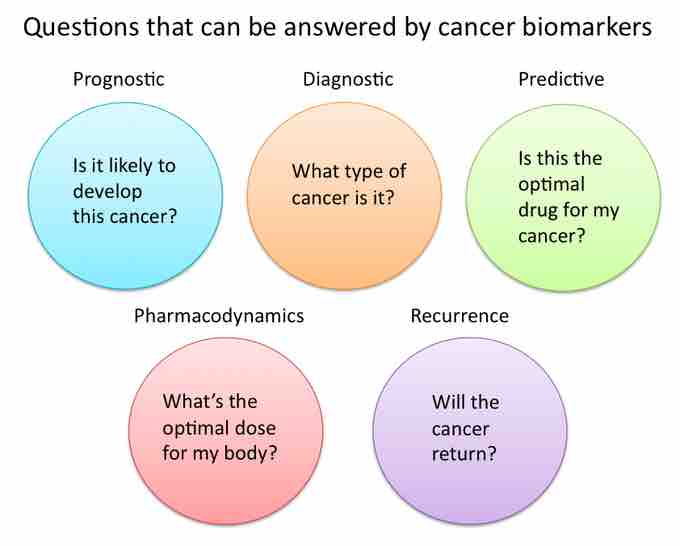Cancer Proteomics
Genomes and proteomes of patients suffering from specific diseases are being studied to understand the genetic basis of diseases. The most prominent set of diseases being studied with proteomic approaches is cancer. Proteomic approaches are being used to improve screening and early detection of cancer, which is achieved by identifying proteins whose expression is affected by the disease process.
An individual protein that indicates disease is called a biomarker, whereas a set of proteins with altered expression levels is called a protein signature . For a biomarker or protein signature to be useful as a candidate for early screening and detection of a cancer, it must be secreted in body fluids (e.g. sweat, blood, or urine) such that large-scale screenings can be performed in a non-invasive fashion. The current problem with using biomarkers for the early detection of cancer is the high rate of false-negative results. A false-negative is an incorrect test result that should have been positive. In other words, many cases of cancer go undetected, which makes biomarkers unreliable. Some examples of protein biomarkers used in cancer detection are CA-125 for ovarian cancer and PSA for prostate cancer. Protein signatures may be more reliable than biomarkers to detect cancer cells.

Questions that can be answered by biomarkers
In cancer research and medicine, biomarkers are used in three primary ways: (A) Diagnostic - To help diagnose conditions, as in the case of identifying early stage cancers. (B) Prognostic - To forecast how aggressive a condition is, as in the case of determining a patient's ability to fare in the absence of treatment. (C) Predictive - To predict how well a patient will respond to treatment.
Proteomics is also being used to develop individualized treatment plans, which involves the prediction of whether or not an individual will respond to specific drugs and the side effects that the individual may experience. In addition, proteomics can be used to predict the possibility of disease recurrence. The National Cancer Institute has developed programs to improve the detection and treatment of cancer. The Clinical Proteomic Technologies for Cancer and the Early Detection Research Network are efforts to identify protein signatures specific to different types of cancers. The Biomedical Proteomics Program is designed to identify protein signatures and design effective therapies for cancer patients.